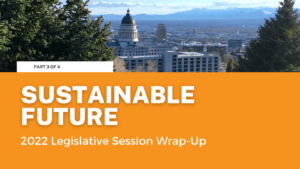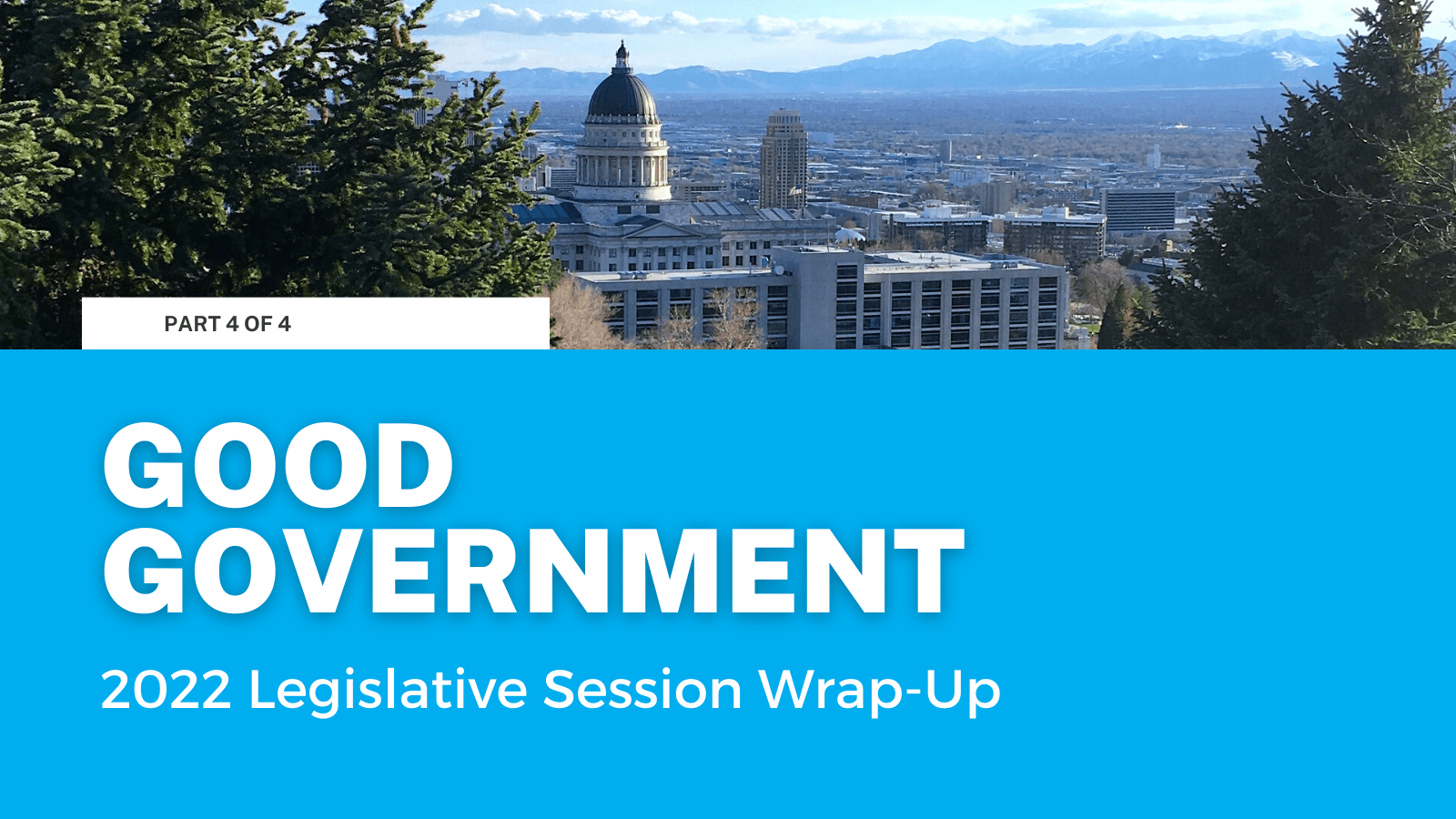This is Part IV of a four-part series looking at the good, the bad, and the ugly of the 2022 General Session of the Utah State Legislature. This is by no means a comprehensive guide to the session, but rather a quick glance at the highlights (and lowlights) of what happened this year on Capitol Hill in four categories: Equal Rights, Strong Communities, Good Government, and Sustainable Future.
People deserve to be represented by governments at the local and national levels that will fight for them, treat them fairly, and conduct their business transparently. We are all better served when governments and elected officials are transparent, ethical, and maintain a robust and functioning public sector. For the needs of people to be met, everyone must have a voice at the ballot box and the ear of their lawmakers. A thriving democracy’s authority comes from—and works for— the people, not special interests.
All these things are important because they instill trust in government, which is fundamental to a healthy and thriving democracy. We have to be able to trust in our government institutions and those who serve us, otherwise the system falls apart or we drift toward authoritarianism.
Utah has generally done well on many of the issues that we consider falling within good governance. We have a relatively progressive election system, having instituted universal vote-by-mail before most other states. The Utah Legislature also has a nationally-recognized website that allows Utahns to easily find and access bills, laws, committee live streams, and other information.
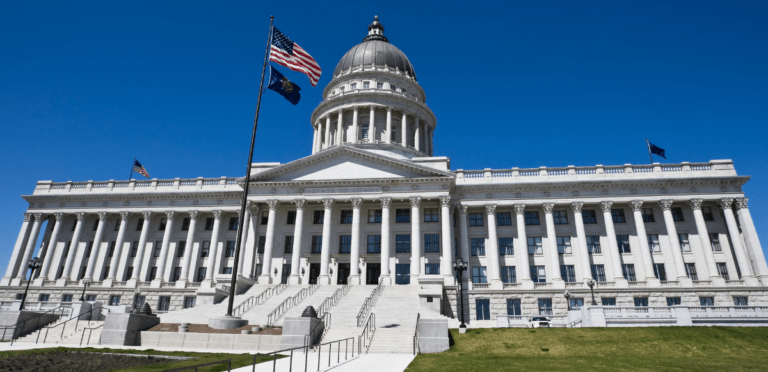
However, we also struggle in other areas. Utah’s campaign finance laws generally allow individuals and organizations to donate as much as they want to candidates and the website containing limited disclosures is hard to navigate. Although it has been improving, our court system still has many areas that need improvement so that justice is freely accessible to all, not just the privileged few.
As we continue to experience extreme polarization and the dangers of misinformation, it becomes more important for everyone to speak out in support of principles of good governance. Elected officials must serve their constituents and voters must hold them accountable. Democracy cannot just be a spectator sport, we have to safeguard, improve, and build it up so that we can continue to enjoy our rights and freedoms for generations to come.
Elections and Voting Rights
Coming into the legislative session this year, Better Utah was concerned with the narrative some outsized voices in our state were putting forward about our election process and voting laws.
As everyone reading this most likely knows, a lot of controversy was spun out of the results of the 2020 presidential election. Not only were there efforts to overturn the election in favor of Donald Trump, aided by Senator Mike Lee, and a violent storming of the U.S. Capitol Building, but we also saw a concerted effort to reduce the trust that Americans place in our election systems. Most of the groundless lawsuits and audits contesting the election results were concentrated in battleground states and were quickly dispensed with by incredulous judges and courageous state election officials that were more concerned with the strength of our core democratic system than fictitious electoral irregularities. However, Utah was not spared from the hysteria that some on the right experienced after Trump’s ouster.
Steve Christiansen, who represented West Jordan in the Utah House of Representatives until he resigned in October 2021, was one of the “prominent” Utahns peddling baseless theories of widespread election fraud here in Utah and across the country. Christiansen helped morph Utah’s “stop the steal” into “secure the vote,” backing a petition to place an initiative on the ballot named “Secure Vote Utah” that would have ended Utah’s universal vote-by-mail system. He also leveraged his official position in an attempt to request the personal information and voting history of every registered voter in the state to help aid initiative backers as they canvassed Utahns seeking evidence of fraud. Christiansen resigned shortly before this unprecedented and invasive request became public knowledge, having also caused embarrassment to his high-profile employer—the LDS Church—with his increasingly high-profile and controversial advocacy, even having used a PowerPoint template from the Church for his digital presentations.
After launching Secure Vote Utah, Christiansen expressed his hope that the ballot initiative would spur his former colleagues in the Utah Legislature “to make the necessary changes now, not next November!” Despite the universal dismissal of official legal complaints by state and federal judges and the extra steps that Utah’s election officials took to explain and defend the comprehensive measures already in place to ensure accurate election results, the narrative spread by Christiansen and others began to take hold among Utah’s far-right.
As lawmakers started to hear more and more strident demands from constituents to increase election surveillance, rollback vote-by-mail, and institute independent election audits, it was no longer a question of whether we would see bills addressing “election security” during the 2022 legislative session, but rather a question of what radical policies would be proposed and how far the bills would go in the process. Here are the “election security” bills that were proposed during the legislative session, along with a summary of what happened as they were considered by lawmakers:
- H.B. 67 (Rep. Mike Petersen) is the most simple of the bills from those attempting to appease the election conspiracy enthusiasts. It requires elections officials to “take action to regularly update” voter registration lists and “provides instructions on the outside of an envelope for returning a ballot mailed to the wrong address.” The bill passed unanimously in both the House and Senate.
- H.B. 313 (Rep. Jon Hawkins) is a wide-ranging bill addressing many of the conspiracies that have been circulating in response to the 2020 election, with many of its provisions simply codifying or clarifying existing law or practice already used by election officials, such as requiring that ballots be printed and distributed in-state, ensuring that election equipment is not connected to the internet, and prohibiting people from voting in Utah and outside of Utah in the same election. Its most controversial policies are a requirement that voters who did not provide voter identification when registering to vote do so with a mail-in ballot, which could be inaccessible to some and possibly raise privacy issues, and a requirement that all ballot drop boxes be under 24/7 video surveillance, something that was vociferously challenged by Sen. Daniel Thatcher. After receiving the general support of the Lt. Governor and her Elections Office, the bill passed mainly on party-line votes in both the House and Senate.
- H.B. 371 (Rep. Phil Lyman) was the most controversial elections bill this year, as it attempted to codify the core provisions of the “Secure Vote Utah” ballot initiative. It would have done away with universal vote-by-mail and required Utahns to primarily vote in-person, in addition to prohibiting “voter registration harvesting,” an extremely vague term that Lyman had trouble fully explaining, and requiring “independent” audits of each election, even though audits are already performed after each election. After a tense committee hearing that filled several overflow rooms with both supporters and opponents, the House Government Operations Committee rejected the bill.
- H.B. 387 (Rep. Mark Strong) requires county clerks to post detailed information online about the ballots they are processing, including the number of ballots they have already processed, are currently processing, have yet to process, and are attempting to cure, among other statistics. It also clarifies the qualifications for poll watchers and the access they are given when observing different portions of the ballot process. The most controversial part of this bill was its original name, “Election Integrity Amendments,” which was changed on the House floor by a motion from Rep. Andrew Stoddard to “Ballot Processing Amendments.” Even with that change, Democrats in the House felt that most of the changes were unnecessary and voted against the bill, but it passed unanimously in the Senate.
- S.B. 219 (Sen. Keith Grover) prohibits election officials from soliciting, receiving, or using grants to help fund elections from individuals or organizations other than government entities. This bill, which passed unanimously, was a response to absurd concerns among many conservatives over the influence of “Zuckerbucks”—donations from Mark Zuckerberg to elections offices across the country to help fill needs that arose from the pandemic.
It’s important to note that the most concerning part of all these bills, even though many were scaled back or outright rejected, is the narrative that was furthered and strengthened by so many people in positions of power giving airtime and credence to unfounded and baseless fears of election fraud, or at the very least, the claim that something needed to be “fixed” with our elections processes. It’s unclear whether some lawmakers truly believed the false narratives coming from the Trump campaign and other bad actors, or if they were running these bills or holding hearings out of a sense of political necessity or advantage. Either way, those elected to a position of public trust should know better. Their words and actions have sown distrust in our democratic system, expanding its power beyond an extremely small minority of voters.
Hopefully these bills were enough to appease those who support much more drastic election reforms and we will not see efforts like “Secure Vote Utah” in future sessions. With that hope, here are some of the other bills impacting elections and voting that we are more accustomed to seeing during the legislative session:
- H.B. 40 (Rep. Nelson Abbott) changes what voters will see on ballots that include judicial retention questions. Until now, the Judicial Performance Evaluation Commission (JPEC) would make a recommendation to voters on whether a judge should or should not be retained. Moving forward, JPEC will determine whether a judge meets or exceeds minimum performance standards and voters will use that evaluation to decide whether the judge should be retained or removed. Passed unanimously.
- H.B. 178 (Rep. Mike Winder) would have adopted the results of the “Municipal Alternate Voting Methods Pilot Project” and used ranked choice voting for all multi-candidate races in municipal primary and general elections. Never received a committee hearing.
- H.B. 395 (Rep. Adam Robertson) would have added “approval voting” to the “Municipal Alternate Voting Methods Pilot Project,” allowing the use of a voting method in city elections where voters simply note whether they approve or disapprove of each candidate, and the candidate with the most “approvals” is selected as the winner. Never received a committee hearing.
- H.B. 411 (Rep. Mike Petersen) requires that any ballot with a fixable issue, such as mismatched signature, be “cured” by three days before the start of the official canvass of the election, presumably so there is enough time to challenge any cures by poll watchers or campaigns. The bill received one “no” vote in the House, but otherwise was supported in the House and Senate.
- H.B. 422 (Rep. Jordan Teuscher) would have allowed local school boards the option of giving 16- and 17-years olds the opportunity to vote in local school board elections. The bill passed out of the House Government Operations Committee but was defeated on the House floor after many lawmakers expressed concerns over the immaturity of teenagers and their susceptibility to manipulation, whether at the hands of outside actors or those running for school board.
- S.B. 170 (Sen. Wayne Harper) shifted the candidate filing deadline from the week after the legislative session to the final week of the legislative session. This controversial change, which was nevertheless supported by both the state GOP and Democratic parties, meant that candidates would need to declare for office before the end of the legislative session, leaving time for lawmakers to take action without fear of inspiring election challengers. Maybe there’s a reason all the controversy over the transgender student sports bill happened in the final hours of the session after the candidate filing deadline?
Last year, Alliance for a Better Utah was approached by a national watchdog organization, the Center for Media and Democracy, with information about resources provided to members of the American Legislative Exchange Council (ALEC) that were not being reported on those members’ financial disclosures. We jointly filed a campaign finance complaint alleging that ALEC failed to disclose providing voter data software to its members in Utah or, alternatively, that Senate President Stuart Adams, chair of ALEC, and Sen. Lincoln Fillmore, Utah’s ALEC state chair, had failed to disclose receiving this software as an in-kind donation. Of course, the complaint was immediately dismissed by ALEC, Adams, and Fillmore as much ado about nothing, but it raised concerns that we felt should have been seriously investigated.
Instead of acting to make sure that candidates and elected officials are properly and transparently disclosing valuable resources they are receiving to aid their electoral efforts, lawmakers doubled down on Utah’s extremely lax campaign finance laws during the legislative session. In a direct response to our complaint, Rep. Jordan Teuscher introduced H.B. 91, a bill that exempts from disclosure all “survey results, voter lists, voter contact information, demographic data, voting trend data, or other information” that isn’t commissioned for a “particular candidate” and is offered at no cost.
In the age of big data, this is a pretty huge exemption! For example, many PACs have access to comprehensive sets of demographic and voting data on every voter in the state and nation, often used to micro-target voters with specific messages meant to influence them in personal ways. This data, which often costs thousands and thousands of dollars, can now be provided to candidates by dark-money PACs without anyone needing to know! Despite our testimony in opposition to this bad bill, it passed unanimously in both the Senate and House.
Although lawmakers did allow this egregious campaign finance bill to pass, they did crack down on the lack of transparency among PACs in another bill. Rep. Gay Lynn Bennion ran H.B. 258, a bill that places additional penalties on individiuals or groups that spend money in elections but fail to register as a political action committee, giving the State Elections Office another tool to ensure transparency in our elections.
Because of its direct impact on the group charged with providing information to Utahns, the transparency-related issue most Utahns heard about this session was the additional restrictions placed on the press.
Both the House and Senate each passed new rules governing their respective members and areas of the Capitol Building that restrict the free movement of the media in “non-public areas.” Previously, members of the press could enter these rooms and hallways after representatives and senators recessed from time on the chamber floor, so they could quickly ask questions about bills or other issues. Now, these capitol reporters can only access these areas with the permission of either the Speaker of the House or a designated media liaison, gumming up the fast-moving process that reporters operate such that it will be more trouble than it’s worth in most cases. The rules changes also restricted members of the press from entering the area behind the dias in committee rooms, a space often used by television and photography reporters, without permission from the committee chair, limiting the ability of reporters to switch between the many committees happening at the same time.
Lawmakers claimed that these changes to press access were being made in the name of security, but this explanation was challenged by reporters and media representatives themselves. They claimed these changes were being made either in retribution for unfavorable media coverage of lawmakers or, alternatively, were a response to one unnamed reporter that was causing problems for the rest. The explanation of it being done in response to unfavorable media coverage carries some weight, as the coverage of The Salt Lake Tribune was repeatedly mentioned during the comments of some unsavvy senators. Either way, the debate between press and the lawmakers they cover spurred discussion of possibly forming a Capitol Hill Press Corps, which would represent and credential press members covering the Utah Legislature, and act as a negotiating body with lawmakers for such rule changes in the future.
Of course, we would be remiss if we didn’t mention that one of the most opaque ongoing practices of the Utah Legislature is the ability of the House and Senate majority caucuses to meet and vote on legislation behind closed doors. Of course, we have no record of specific votes that have doomed pieces of publicly supported legislation. But through circumstantial and hearsay evidence, we know that both the House and Senate GOP caucuses regularly determine the fate of legislation by polling their own members ahead of advancing or killing pieces of legislation in the Rules Committees, leading to a lack of transparency in the legislative process and inability to hold lawmakers accountable for their positions and actions taken on bills.
On the front of the United States Supreme Court building, you’ll find the phrase “Equal Justice Under Law” etched into the marble above the columns that frame the entrance. Of course, an ideal is not reality and justice is often not equal, or even equally accessible, for all.
Lawmakers took an important step toward providing greater access to all Utahns by passing S.B. 87, a bill introduced by Sen. Jani Iwamoto this session. The bill allows courts to waive fees, costs, or security for “indigent” individuals, a legal term that means “poor” or those suffering from extreme poverty. It even goes so far as to require courts to waive such costs when an individual is making less than 150% of the federal poverty level, receiving financial assistance, or otherwise can demonstrate indigency. The bill passed both the House and Senate unanimously.
Keep an eye out for the 2022 edition of our annual Progress Report! Each year, we take all the votes on dozens of bills in four categories–strong communities, equal rights, good government, and sustainable future–and give each lawmaker grades in each category and for their overall commitment to progressive values. The Progress Report is not only useful to better understand how your representative and senator voted during the legislative session, but is a great tool to help inform your vote during election time!
This year’s Progress Report will be released in May at progressreport.betterutah.org.
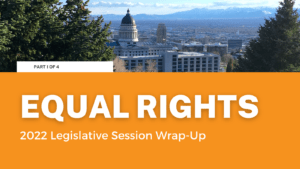
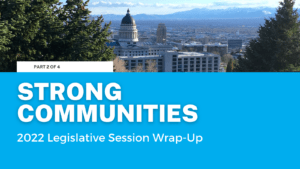
Wrapping up the 2022 Legislative Session: Strong Communities
